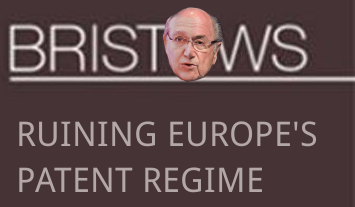

"They -- lawyers, attorneys, clerks etc. -- really profited a great deal from all the trolling and in recent years that sort of stopped, giving way to more productive work rather than prohibitive litigation costs."World Intellectual Property Review (WIPR) has just published this report about American and Korean companies fighting over patent infringement in Germany. So guess whose lawyers are hired. This may be good for some German law firms, but celebrating this would be a mistake (along the lines of championing the Eastern District of Texas, which nowadays repels actual businesses). To quote WIPR:
Engineered materials company Rogers Corporation, based in the US, has sued Korean chemical and auto parts manufacturer KCC Corporation for patent infringement in Germany.
Rogers announced yesterday, June 5, that its German subsidiary had filed the lawsuit in Düsseldorf, citing infringement of European patent number 1 061 783. The patent is called “Ceramic-metal substrate, particularly multiple substrate”.
According to Rogers, KCC has infringed the patent by offering in Germany direct bonded copper (DBC) substrate master cards that contain patented features.
"The feline blog is in decline. It even embraced censorship of opposing/dissenting views because the goal is agenda-setting, not an open forum."Eibhlin Vardy, by writing about "the EPO's Patenting of Artificial Intelligence conference" a couple of days ago, carries on with the EPO propaganda that's labeling software patents "AI" in order to bypass the rules and eventually grant bogus patents. Her second post is just marketing from a law firm: "Following on from this morning's post reporting on the EPO's Patenting of Artificial Intelligence conference, Katfriend Gwilym Roberts of Kilburn & Strode provides an insight into the ethical dilemmas that arise in this area. This one should provoke discussion and debate!"
There's almost no debate there. It's more like a commercial -- the very type of stuff that caused staff to leave IP Kat. The feline blog is in decline. It even embraced censorship of opposing/dissenting views because the goal is agenda-setting, not an open forum. Why bother commenting?
Eibhlin Vardy preceded this 'commercial' with a 'report' which merely amplifies or helps EPO with its lobbying event (advocacy for software patent applications). Some of the 'usual suspects' are named again (Lievens, Ménière, Philpott). These are patent maximalists who blatantly promote software patents. To quote:
The first two keynote speakers analysed AI as a driving force of the 4th Industrial Revolution (4IR). Clare Dillon, a technology evangelist, gave an insightful introduction into the topic and shared her vision on the formula of success for AI, namely the combination of ‘Technical innovation + digital culture + economic viability’. Her presentation was followed by another keynote speaker, Yann Ménière (EPO Chief Economist), who highlighted the dramatic increase in patent applications related to smart objects within the last several years. A third keynote speaker Koen Lievens (EPO Director) explained how the EPO examines patent applications in the area of AI.
[...]
As Grant Philpott (EPO Chief Operating Officer ICT) noted in his concluding remarks, adapting the patent system designed for hardware innovation to the virtual world of software innovation has been a long and difficult process, but ultimately, Europe and the EPO have succeeded in developing a highly methodical approach to the patenting of CIIs, which is firmly rooted in EPC case law and EPO practice. However, as AI software becomes super-software, incredibly powerful and versatile, the challenges for our patent system are likewise significant. Events such as this help us to meet that change and ensure that AI and its impact on patents and patentability continues to be dealt with systematically and in line with the laws and needs of stakeholders. Only by doing so can our system provide the stability and predictability that the industry needs for its business models, and further support economic growth of Europe.
In addition to the European Commission’s proposed Supplementary Protection Certificates waiver, we identify the biggest SPC cases and analyse Brexit’s implications
Few issues in the IP industry are as complex, debated and divisive as Supplementary Protection Certificates (SPCs).